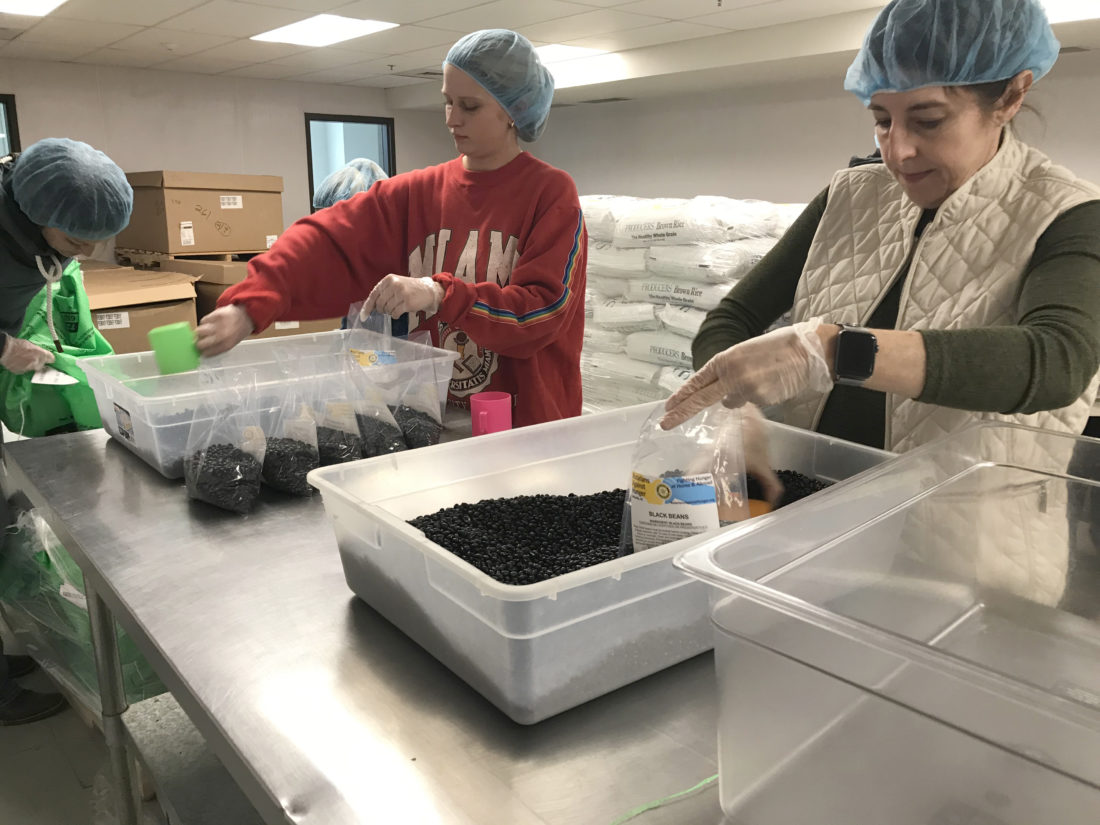Economic life in Western North Carolina has undeniably slowed as residents follow social distancing guidelines to fight the spread of COVID-19. Concerts, restaurants, shops, breweries, gyms, salons and some retail stores have all shut down or adapted to reduce person-to-person contact, and as a consequence, decrease transmission of the disease caused by the new coronavirus.
But outside those closed doors, nature brings reassuring signs: fragrant peach blossoms, purple wildflower explosions, wild onion ready for the picking. Similarly, myriad nonprofit and community groups are springing into action to help locals persevere through the crisis. As existing organizations adjust their work to focus on COVID-19 needs and new efforts begin to knit neighbors together, community resilience is blooming throughout WNC.
Importantly, the most helpful action those at high risk of complications from the virus can take — people with preexisting health conditions such as heart disease or a compromised immune system, pregnant women, those who live in a nursing home or long-term care facility, the severely obese and those aged 65 and over — is to stay at home. By avoiding illness, residents at the greatest risk for the most severe consequences of the disease can help ensure that health workers will have the capacity to deal with the possible surge of serious COVID-19 cases.
Business as unusual
Even before the coronavirus hit WNC, MANNA FoodBank saw substantial needs throughout the community, notes spokesperson Kara Irani. But due to the “cascading economic implications” of job losses caused by COVID-19, she says, even more families are finding themselves with food insecurity.
Simultaneously, Irani points out, the specific nature of the current crisis is hindering MANNA’s ability to respond. Higher-than-normal grocery demand and stockpiling by residents has sharply cut the flow of food donations, which normally make up 80% of the nonprofit’s inventory. And because at least half of its existing volunteer base is 65 or older, fewer people are able to show up for shifts to fill family food boxes and kids packs.
In response, Irani says MANNA is specifically recruiting younger volunteers and taking extensive precautions to keep those workers healthy. “Every volunteer who enters is required to wash their hands immediately, keep 6 feet of distance between themselves and others and wear gloves, hairnets and other safe food-handling needs,” she says. “We will begin checking everyone who enters the building for a temperature, and anyone who presents with a temperature will be required to exit the building immediately.”
Among MANNA’s approaches to reaching new volunteers is the United Way of Asheville and Buncombe County’s Hands On online platform. United Way spokesperson Elisabeth Bocklet says 133 people had signed up for COVID-19 volunteering updates as of March 18. She adds that her organization has been working with Buncombe County government through its emergency operations center to track community resources and needs as they evolve through the crisis.
“One of the biggest needs right now is for everyone to have a centralized and clear understanding of the social service landscape, who is doing what and where are the gaps,” Bocklet says. “So our top priority is to build out that picture.”
Neighbors helping neighbors
Beyond these large-scale nonprofits, smaller groups of citizens are spontaneously organizing less centralized responses. Zev Friedman, creative director for Co-operate WNC, says his mutual aid network aims to link people together to meet needs that they cannot meet alone, such as child care and bulk seed orders for community food production.
Although the network was initially organized in response to the threat of climate change, Friedman says many of Co-operate WNC’s strategies are equally applicable to COVID-19. Locally controlled food and energy production, community-based governance and cooperative health care, he suggests, are resilient to all forms of disaster; the virus is merely casting the need for such systems into sharper relief.
“The climate emergency, which is truly an emergency, is operating at just a slightly longer time scale than humans intuitively make decisions. So many of us are able to insulate ourselves psychologically from the dramatic changes and losses that are occurring, and in a way continue to pretend it’s not happening,” Friedman says. “COVID-19 cuts right through that facade and shatters our complacency — no one is pretending anymore that we are in the territory of business as usual.”
Efforts are also taking shape through social media. Asheville Survival Program, a Facebook group established on March 13, has gained over 1,400 members as of press time to share resources such as herbal approaches to fighting respiratory infections. And many on Nextdoor, such as Oakley resident (and occasional Xpress freelancer) Ali Mangkang, are taking advantage of that platform’s geographically oriented networks to organize their immediate communities amid a deluge of outside communication.
“I feel like I’ve seen an email or social media post from every business in Asheville in the past week! It’s a lot to process, especially when information is being shared from the federal level on down to the community level,” Mangkang says. “My personal goal is just to help coordinate a virtual exchange of services and information in my own neighborhood.”



Before you comment
The comments section is here to provide a platform for civil dialogue on the issues we face together as a local community. Xpress is committed to offering this platform for all voices, but when the tone of the discussion gets nasty or strays off topic, we believe many people choose not to participate. Xpress editors are determined to moderate comments to ensure a constructive interchange is maintained. All comments judged not to be in keeping with the spirit of civil discourse will be removed and repeat violators will be banned. See here for our terms of service. Thank you for being part of this effort to promote respectful discussion.